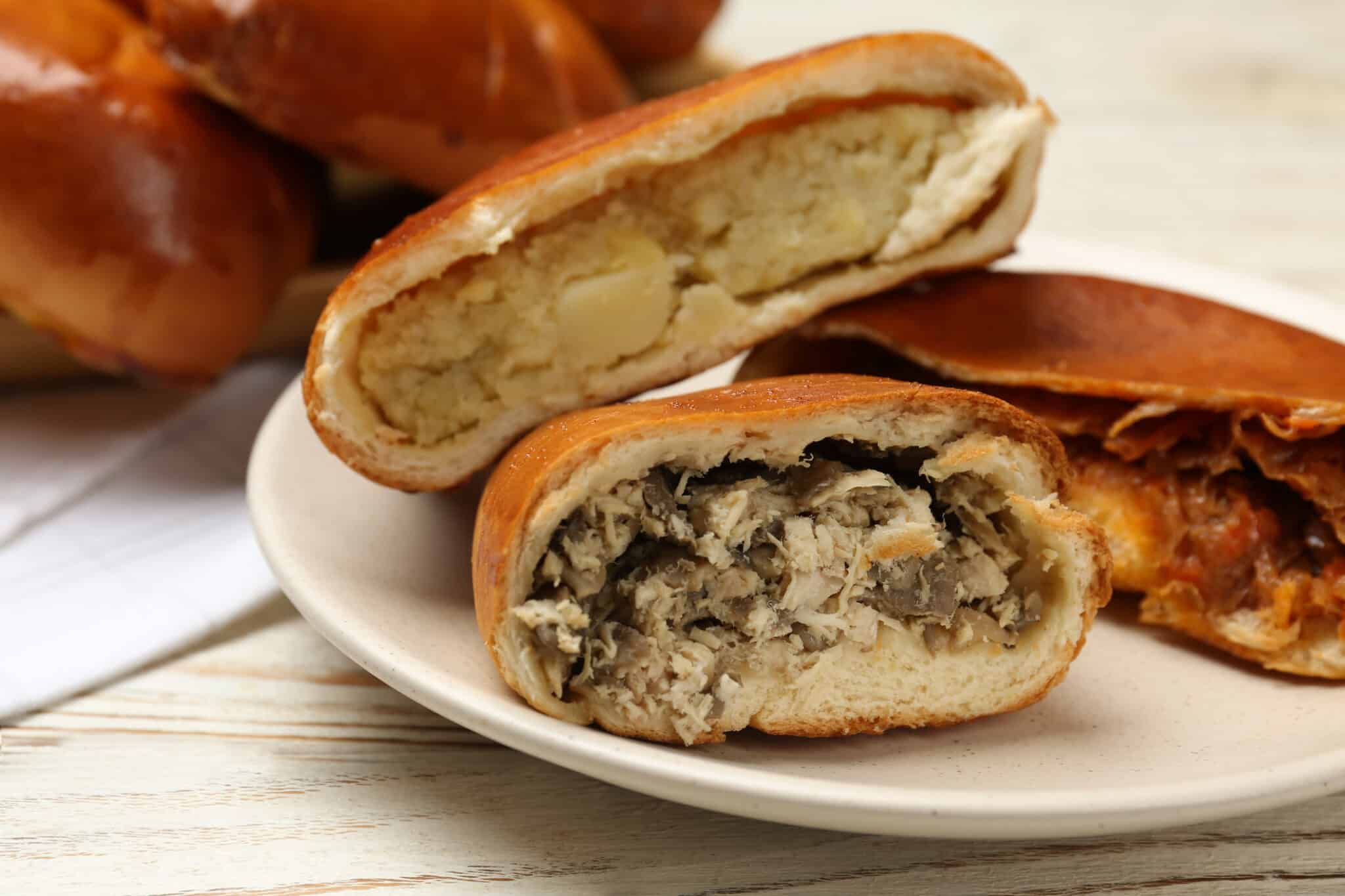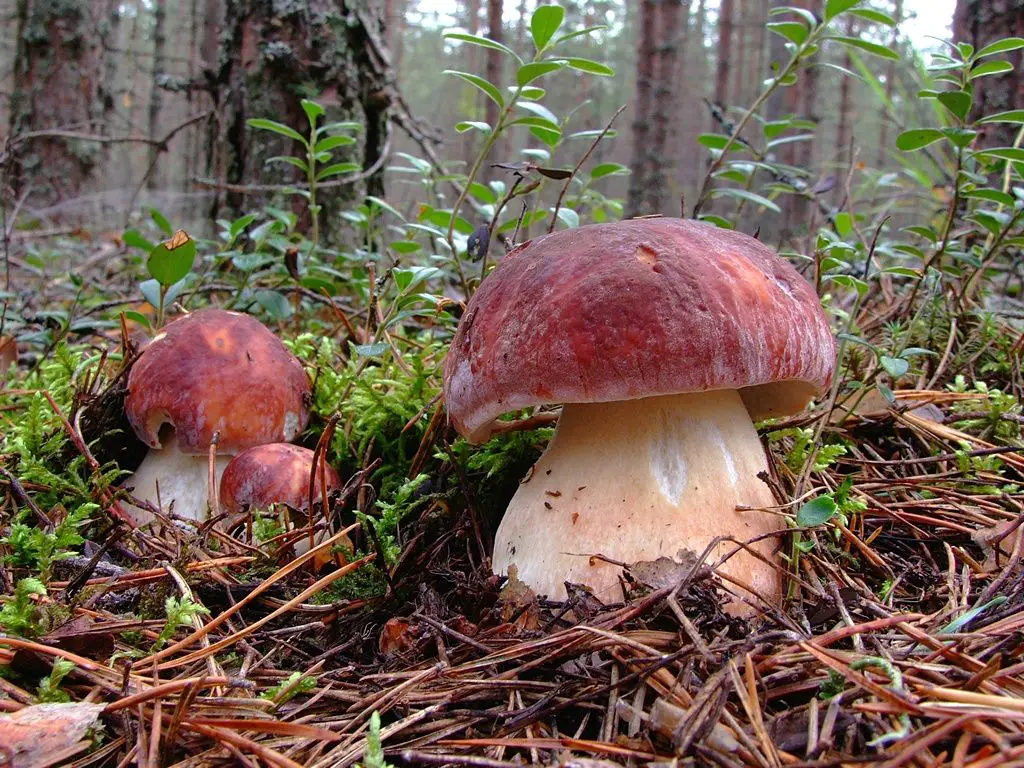Olga below continues her discussion of the deeply held place that mushrooms have in Russian culture. In part one of this discussion, she focused on how and where and find the mushrooms. In part two, below, she discusses how the mushrooms are preserved, prepared, and consumed. A staple of the regional diet for centuries, mushrooms now have myriad uses in local cuisines.
This resource is part of a series of free Russian lessons sponsored by SRAS called Olga’s Blog. The blog documents – in simplified, modern Russian – Olga’s experience finishing high school, starting college, and living life in Moscow in 2006-2007. The text, links, and format of this resource were last updated in 2023.
Briefly on Mushrooms in Europe’s North Eastern Forests
Russia is not the only mycophilic (fungus-loving) culture in its region. This designation is shared with Scandinavia, the Baltics, and much of Eastern and Central Europe. The whole region shares landscapes and weather patterns, and thus shares many culinary ingredients that grow under these common conditions.
Common practices are also shared in how the mushrooms are preserved and eaten. They can be cooked fresh or pickled or dried for long-term storage. They are eaten as part of stews and soups, baked into pies, or eaten on their own. They can be an particularly important source of protein on religious holidays, many of which are vegetarian or even vegan. For instance, in Poland, Christmas Eve dinner, known as Wigilia, is meatless and often features borsch with mushroom dumplings and a mushroom and cabbage side dish, among other options.
Mushrooms are highly versatile ingredients. Their unique flavors and textures have made them essential in, for instance, Polish and Latvian cuisine. Poland’s bigos, perhaps its most uniquely national dish, most often features mushrooms. Latvian cuisine features mushroom cutlets and mushrooms are often added to potato pancakes. Both countries have dishes that are often dressed in mushroom sauce.
Traditions of mushroom picking and the relatively heavy use of mushrooms in national dishes helps to distinguish the cultures of this region from others and thus contributes in part to concepts of national identity.
Mushrooms in Russian Cuisine and Culture: Simplified Russian Text from Olga’s Blog
This is Lesson 14 of Olga’s Blog, a series of intermediate Russian lessons.
Note that:
- All of the bold words and phrases have annotation below.
- Red words and phrases indicate the subject of this blog entry’s grammar lesson.
- *Asterisks indicate slang.
Дорогие друзья!
Однажды мы с родителями увидели засохшее дерево, полностью облепленное опятами. Для того, чтобы собрать грибы с верхушки, я встала папе на плечи, и только тогда достала их.
Собранные грибы в этот же день тщательно перебирают. Есть несколько способов приготовления грибов. В основном это зависит от их сорта. Белые, подберезовики и подосиновики можно жарить, варить, мариновать или сушить и замораживать для длительного хранения. Грузди обычно только солят с добавлением различных пряностей. Опята чаще жарят или замораживают после предварительного отваривания.
Bсе свежие грибы особенно вкусны, если их пожарить с луком и растительным маслом. При этом весь дом наполняется лесным ароматом. Суп из сушеных грибов по содержанию белка не уступает мясному. Поэтому во время поста одним из основных блюд для христиан являются грибы.
В праздничные дни грибы запекают в глиняных горшочках с овощами и сыром, пекут пироги с грибной начинкой и множество других вкусных блюд. Соленые грибы, приправленные маслом и зеленью, являются универсальной закуской на русском столе.
Самые вкусные грибы продаются на рынках, но если вы опасаетесь покупать их там, то берите их в супермаркетах. Но интереснее всего собирать грибы самим. Я с удовольствием составлю вам компанию.
Vocabulary and Cultural Annotations
Засохшее дерево: Dead tree. Note that “засохшее” is an adjectival form of the verb “засохнуть / засыхать,” which also means “to dry up” or “to wither.”
Облепленное: Covered (with) (Remember that a list of the various types of common mushrooms was given in the first part of this blog entry.)
Я встала папе на плечи: I stood on my father’s shoulders. Note the use of cases in this phrase – папе (dative), and на плечи (prepositional)
Собранные грибы в этот же день тщательно перебирают: We carefully sorted the mushrooms on that very same day. Some native Russians also pointed out to us a rhetorical twist to this sentence as “тщательно” can mean both “carefully” and “thoroughly” and while “перебирают” can mean “to take in excess” or to “sort out” or “to look over.” Thus, at one time, Olga may be reveling in the bountiful harvest and complimenting herself and her father for their careful and diligent work. However, other Russians have argued that this rhetorical analysis may be a bit of stretch.
Длительное хранение: Long-term storage; preservation.
Различные пряности: various spices. Note that the sigular, пряность is feminine although it ends in “ь.” Here we have used the plural as “различная пряность” in Russian reads a bit strangely (as would “various spice”) in English, in our view. You may also find the word “пряность” familiar as it is related to “пряник,” the well-known Russian gingerbread cookie.
Предварительное отваривание: an preliminary boiling. The word “предварительное” indicates that the word it modifies is only a first step in a longer process even though the word “отваривание” indicates that the boiling is thorough.
Суп из сушеных грибов по содержанию белка не уступает мясному: A soup made from dried mushrooms is not inferior in protein (levels) to (soup made from) meat. “Уступить/уступать” means “to cede to” or “to be inferior to.”
Пост: a Russian holiday equivalent to Lent in Catholicism. The word “пост” can also refer to simply “a fast” as in “fasting.” The holiday that Olga is referring to here is often called “Великий пост” in order to differentiate it from other fasts that the Orthodox Church observes and/or that individuals might commit to. During times of fasting, Russians are, among other things, expected to give up meat. Russians who follow this practice believe that a diet high in traditional “fast” foods like mushrooms and grechka cleanses the body and frees the spirit.
Праздничные дни – holiday days. This phrase is usually used to refer to a holiday celebrated over several days. Великий пост lasts for 40 days. The plural “праздники” generally refers to multiple holidays.
Запекать в глиняных горшочках – to bake in clay pots. This is considered a traditional Russian and exceptionally tasty way to prepare foods.
Начинка: filling; stuffing. In slang, the world “начинка” is used to refer to “insides” or “guts” such as “электронная начинка автомобиля,” meaning “the electronic ‘guts’ of the car.”
Соленые грибы, приправленные маслом и зеленью: Pickled mushrooms seasoned with oil and greens. These, together with pickled cucumbers and pickled tomatoes are the most popular Russian “закуски” (see below). All three, especially with black bread, are traditional accompaniments to vodka.
Закуска: appetizer or snack.
С удовольствием: with pleasure. This phrase is often used to refer to acts performed with or for someone.
Составить компанию: to keep company. “Составить / составлять” means “to make,” “to compile,” or “to prepare.”
Grammar Focus: Conjunctions, Part II
The conjunction is an auxiliary part of speech linking homogeneous parts within a simple sentence or simple sentences within a compound sentence.
– чтобы –
Чтобы полюбить музыку, надо прежде всего ее слушать. (Russian composer D. Shostakovich)
In order to fall in love with music, one must first of all listen to it.
The conjunction чтобы is a conjunction of purpose meaning “in order to.” Sometimes “для того, чтобы” is also used with the same meaning.
– так как –
Жили да были два генерала, и так как оба были легкомысленны, то в скором времени, по щучьему велению, по моему хотению, очутились на необитаемом острове (Saltykov-Shchedrin, A Tale of How One Man Fed Two Generals).
Once upon a time, there were two generals, and, because they were both not-to-bright, they were quickly whisked off on my orders to live on an uninhabited island.
“Так как” is a a causal conjunction meaning “because.” A much more commonly used preposition meaning “because” is “потому что.”
– если –
Если вашу дочь лечил фабричный врач, то пусть и продолжает лечить. (Chekhov, Case Study)
If your daughter has been treated by the factory’s doctor, then let him continue to treat her.
“Если” is a conditional conjunction meaning “if.” “Который” is also a conditional conjunction meaning “who,” “which,” or “that.”
– пока –
Пока я говорил, Ася все больше и больше наклонялась вперед – и вдруг упала на колени, уронила голову на руки и зарыдала. (Turgenev, Asya)
While I spoke, Asya leaned closer and closer – and then suddenly fell to her knees, dropped her head in her hands and began to sob.
“Пока” is a temporal conjunction meaning “while” or “until.” “Когда,” meaning “when” or “while” is another temporal conjunction.
– как будто –
Дом также стоял неподвижно, нерадушно, как будто ему дела не было до того, кто приехал в него. (Tolstoy, War and Peace)
The house was standing motionlessly, inhospitably, as if it did not care about the person who entered it.
“Как будто” is a comparative conjunction meaning “as though” or “as if.”
– что –
Владимир с ужасом увидел, что он заехал в незнакомый лес. (Pushkin, Tales of the Late Ivan Petrovich Belkin)
Vladimir, horrified, realized that he entered an unfamiliar forest.
“Что” is an explanatory conjunction meaning “that” which introduces independent clauses. For dependent clauses, “чтобы,” which means “to (do something)” is used.
Всё сбиваю ее, уговариваю, чтоб она учиться пошла. (Chekhov, The Bride)
I am trying to drill it into her head to persuade her to study.
– несмотря на то что –
В степи было тихо, пасмурно, несмотря на то, что солнце поднялось. (Tolstoy, Cossaks)
It was quiet and cloudy on the steppe despite the fact that the sun had risen.
“Несмотря на то что” is a concussive conjunction meaning “despite” or “in spite of.”
More Free Russian Lessons From Olga’s Blog

The Language and History of Caviar: Olga’s Blog
Olga below describes the place of caviar in Russian food culture. In simplified Russian, she describes where the delicacy is harvested from, the major types of caviar, and how the types differ in cost and quality. We also provide an English primer below discussing more of the history of caviar, how it is eaten and […]

Mushrooms in Cultures and Cuisines: Olga’s Blog
Olga below continues her discussion of the deeply held place that mushrooms have in Russian culture. In part one of this discussion, she focused on how and where and find the mushrooms. In part two, below, she discusses how the mushrooms are preserved, prepared, and consumed. A staple of the regional diet for centuries, mushrooms […]

Mushroom Season Has Begun! Olga’s Blog
Olga below discusses the deeply held national tradition of mushroom gathering. An important part of Russian food tradition for many centuries, Russian children are taught in school from an early age to tell the difference between various types of native mushrooms. Many, like Olga, will go with relatives and friends to the woods to put […]

Study Abroad in America for Russians: Olga’s Blog
As part of her major program in international relations at Moscow State University, Olga applied to study abroad in the United States in 2007. As was not uncommon for students applying for study abroad in either direction, Olga hit several bureaucratic snags. What is perhaps most remarkable about the below text, however, is the description […]

What is the First Day of University Like in Russia? Olga’s Blog
Below, Olga discusses what a first year freshman experiences on day one of their college education. The day offers no classes. It is instead filled with speeches, handshakes, and status symbols. All of this is highly indicative of the role of formality and ceremony in Russian education and Russian society. This resource is part of […]






